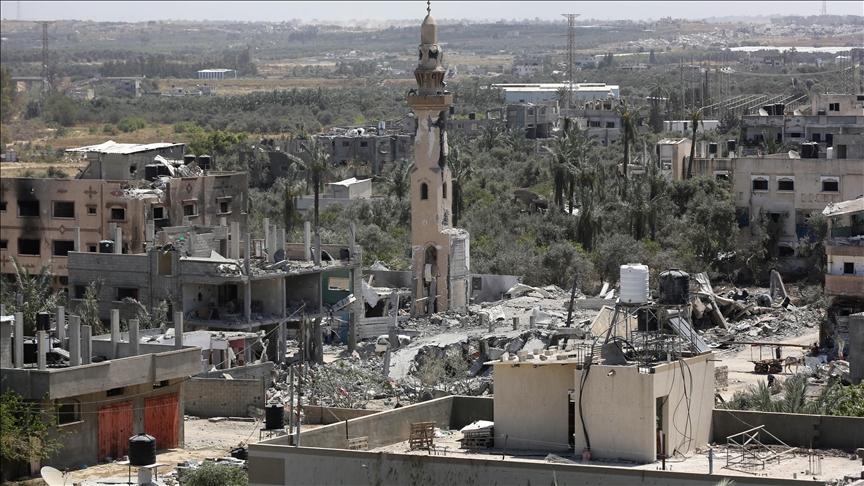Israeli opposition leader says maintaining army in Philadelphi, Netzarim corridors ‘strategic mistake’
Keeping forces in two corridors would expose Israeli soldiers to attacks from both directions, says Yair Golan
 A view of buildings rendered unusable near the Netzarim Corridor area of the Gaza-Israel border in Gaza City, Gaza on April 21, 2024.
A view of buildings rendered unusable near the Netzarim Corridor area of the Gaza-Israel border in Gaza City, Gaza on April 21, 2024.
JERUSALEM
Yair Golan, the leader of Israel's left-wing Democrats party, criticized the government Wednesday for its decision to maintain military forces in Gaza’s Philadelphi and Netzarim corridors, calling it a “strategic mistake” that endangers soldiers' lives.
In a post on the social media platform X, Golan urged the government to withdraw Israeli troops from Gaza, arguing that their presence “offers no strategic benefit.
“The core issue isn't about strengthening Hamas along the Philadelphi corridor on the Gaza-Egypt border,” he said. “It's about the money Netanyahu has allowed to flow into Gaza in the past.”
He further warned that “maintaining forces in both the Philadelphi and Netzarim corridors, which separate northern and southern Gaza, would expose Israeli soldiers to attacks from both directions.”
He advocated for an alternative security measure, citing the readiness of Washington and Cairo to establish a security barrier along the Gaza-Egypt border which would safeguard Israeli interests without requiring a military presence in the Philadelphi corridor.
Israeli Prime Minister Benjamin Netanyahu continues to stress the importance of retaining control over key areas like the Philadelphi corridor, despite growing opposition from figures like Golan.
As indirect cease-fire negotiations between Israel and the Palestinian group Hamas reach a critical juncture, Netanyahu's insistence on controlling both the Philadelphi and Netzarim corridors has emerged as a major sticking point.
Hamas has demanded a full Israeli withdrawal and the return of displaced Palestinians.
Israel has continued its brutal offensive on the Gaza Strip since an Oct. 7 attack by Hamas, despite a UN Security Council resolution demanding an immediate cease-fire.
More than 40,800 Palestinians, mostly women and children, have since been killed and nearly 94,400 others injured, according to local health authorities.
An ongoing blockade of the enclave has led to severe shortages of food, clean water and medicine, leaving much of the region in ruins.
Israel faces accusations of genocide for its actions in Gaza at the International Court of Justice.
*Writing by Mohammad Sio








